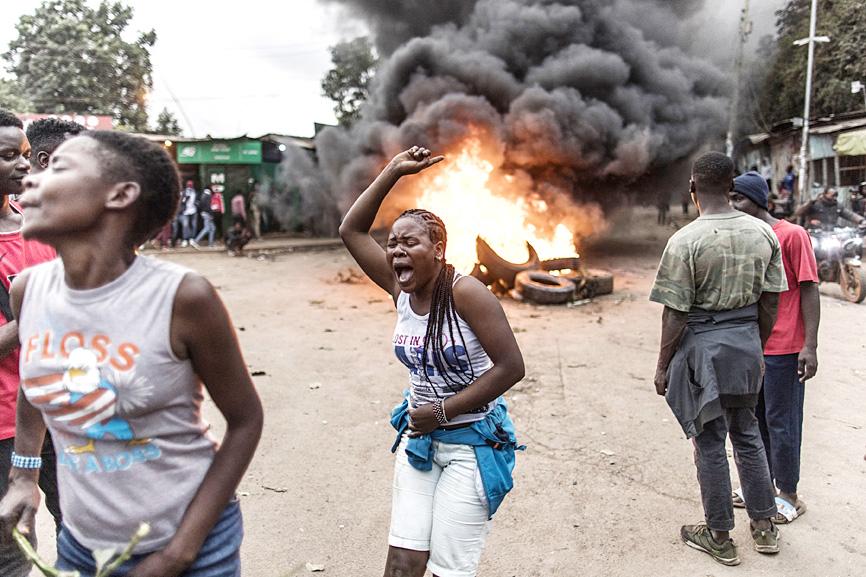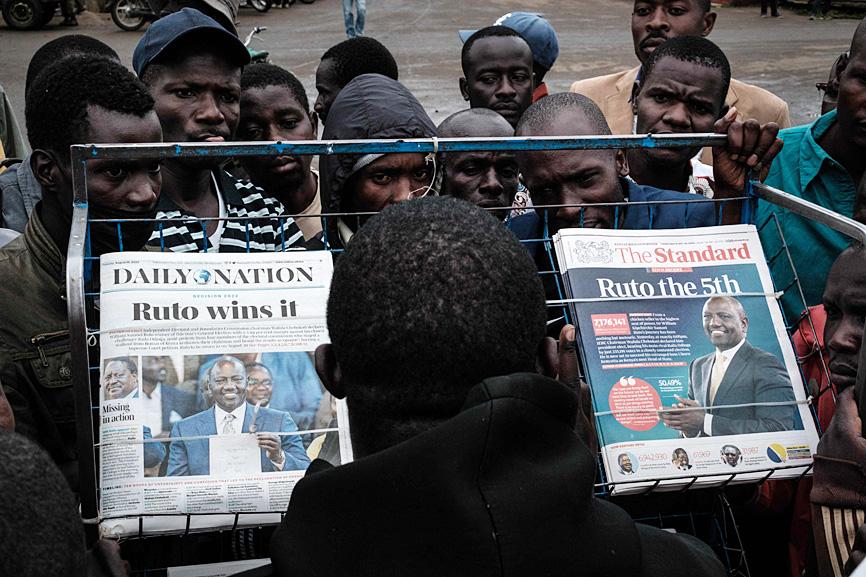Kenyans were yesterday braced for a potential period of uncertainty after Kenyan Deputy President William Ruto was proclaimed winner of the hard-fought presidential election, but his opponents cried foul.
All eyes were on defeated rival Raila Odinga, who failed at his fifth stab at the presidency, but has yet to make any public comments about the outcome of the election on Tuesday last week.
After an anxious days-long wait for results, the 55-year-old Ruto was declared president-elect on Monday with a narrow victory over Odinga, the veteran opposition leader who had stood with the backing of the ruling party following a stunning shift in political allegiances.

Photo: AFP
The aftermath of the largely peaceful vote would be closely watched as a test of democratic maturity in the East African powerhouse, where previous elections have been marred by claims of rigging and bloodshed.
“Ruto it is,” the front page headline in People Daily read, while the Standard declared “Ruto the 5th,” as he will become Kenya’s fifth president since independence from Britain in 1963.
The results announcement did little to calm nerves, with the election commission that supervised the vote itself split over the outcome and demonstrators in Odinga’s strongholds hurling stones and setting fire to tires.

Photo: AFP
On the campaign trail, Odinga and Ruto had pledged to deal with any disputes in court rather than on the streets.
“I will work with all leaders in Kenya so that we can fashion a country that leaves nobody behind,” Ruto said in his victory speech, pledging to run a “transparent, democratic, open government” for all Kenyans.
“There is no room for vengeance,” said Ruto, who had run as the effective challenger after falling out with his boss, outgoing Kenyan President Uhuru Kenyatta.
“I am acutely aware that our country is at a stage where we need all hands on deck to move it forward,” Ruto said.
He said the election had been fought on issues as much as “ethnic configurations” in a country where tribal affiliations have been a feature of every vote and led to vicious bloodletting after the disputed 2007 poll.
The rags-to-riches businessman had painted the vote as a battle between ordinary “hustlers” and the Kenyatta and Odinga “dynasties” that have dominated Kenyan politics since independence.
His conciliatory message did not stop supporters of 77-year-old Odinga — known as Baba (“father” in Swahili) — from packing the streets in his lakeside stronghold of Kisumu, where they clashed with police who fired tear gas to disperse them.
Protests also erupted in two Nairobi slums that have long been Odinga bastions.
The situation yesterday appeared to be calm, with some police on patrol as people headed to work, although the streets of the capital, Nairobi, were emptier than usual.
No presidential poll outcome has gone uncontested in Kenya since 2002, and a supreme court challenge by Odinga is seen as almost certain, with his running mate Martha Karua writing on Twitter: “It is not over till it is over.”
The race remained unpredictable to the end, with Ruto scoring 50.49 percent of the vote compared with 48.85 percent for Odinga, Independent Electoral and Boundaries Commission (IEBC) chairman Wafula Chebukati said.
In an extraordinary move shortly before the announcement, four of the IEBC’s seven commissioners said they disowned the results, with one describing the process as “opaque,” but giving no details.
The IEBC was under intense pressure to produce a clean and transparent vote after it faced stinging criticism over its handling of Kenya’s annulled 2017 election.
Chebukati, who was also IEBC boss in 2017, said he had carried out his duties according to the law of the land despite facing “intimidation and harassment.”
Any challenge must be made within seven days to the supreme court, which then has 14 days to issue a ruling. If it orders an annulment, a new vote must be held within 60 days.
“A second election would be even more polarized, dragging out business uncertainty while the economy struggles,” Ben Hunter, Africa analyst at Verisk Maplecroft risk intelligence group, said in a note.

Ukraine’s military intelligence agency and the Pentagon on Monday said that some North Korean troops have been killed during combat against Ukrainian forces in Russia’s Kursk border region. Those are the first reported casualties since the US and Ukraine announced that North Korea had sent 10,000 to 12,000 troops to Russia to help it in the almost three-year war. Ukraine’s military intelligence agency said that about 30 North Korean troops were killed or wounded during a battle with the Ukrainian army at the weekend. The casualties occurred around three villages in Kursk, where Russia has for four months been trying to quash a

FREEDOM NO MORE: Today, protests in Macau are just a memory after Beijing launched measures over the past few years that chilled free speech A decade ago, the elegant cobblestone streets of Macau’s Tap Seac Square were jam-packed with people clamouring for change and government accountability — the high-water mark for the former Portuguese colony’s political awakening. Now as Macau prepares to mark the 25th anniversary of its handover to China tomorrow, the territory’s democracy movement is all but over and the protests of 2014 no more than a memory. “Macau’s civil society is relatively docile and obedient, that’s the truth,” said Au Kam-san (歐錦新), 67, a schoolteacher who became one of Macau’s longest-serving pro-democracy legislators. “But if that were totally true, we wouldn’t

ROYAL TARGET: After Prince Andrew lost much of his income due to his friendship with Jeffrey Epstein, he became vulnerable to foreign agents, an author said British lawmakers failed to act on advice to tighten security laws that could have prevented an alleged Chinese spy from targeting Britain’s Prince Andrew, a former attorney general has said. Dominic Grieve, a former lawmaker who chaired the British Parliament’s Intelligence and Security Committee (ISC) until 2019, said ministers were advised five years ago to introduce laws to criminalize foreign agents, but failed to do so. Similar laws exist in the US and Australia. “We remain without an important weapon in our armory,” Grieve said. “We asked for [this law] in the context of the Russia inquiry report” — which accused the government

TRUDEAU IN TROUBLE: US president-elect Donald Trump reacted to Chrystia Freeland’s departure, saying: ‘Her behavior was totally toxic, and not at all conducive to making deals Canadian Deputy Prime Minister Chrystia Freeland on Monday quit in a surprise move after disagreeing with Canadian Prime Minister Justin Trudeau over US president-elect Donald Trump’s tariff threats. The resignation of Freeland, 56, who also stepped down as finance minister, marked the first open dissent against Trudeau from within his Cabinet, and could threaten his hold on power. Liberal leader Trudeau lags 20 points in polls behind his main rival, Conservative Pierre Poilievre, who has tried three times since September to topple the government and force a snap election. “It’s not been an easy day,” Trudeau said at a fundraiser Monday evening, but